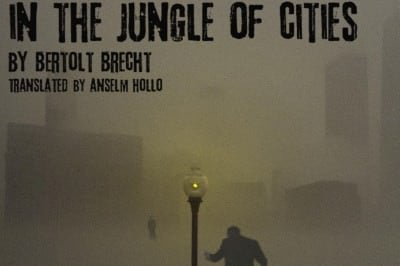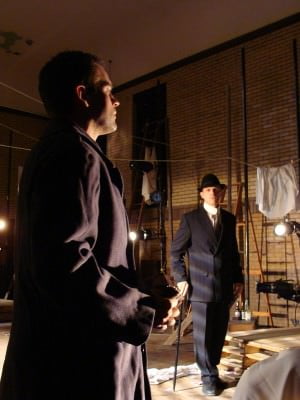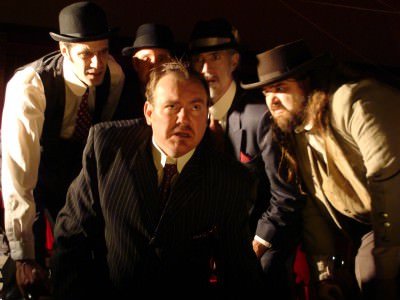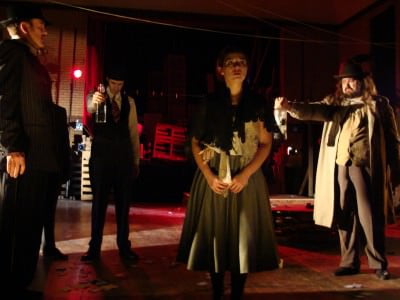In The Jungle of Cities
Directed by Max Truax
Produced by Ka-Tet Theatre Company
At Red Tape Theatre, Chicago
“You are in Chicago in 1912. You are about to witness an inexplicable wrestling match between two men and observe the downfall of a family that has moved from the prairies to the jungle of the big city. Don’t worry your heads about the motives for the fight, concentrate on the stakes. Judge impartially the technique of the contenders, and keep your eyes fixed on the finish.” – Bertolt Brecht (1898 – 1956) about In The Jungle of Cities from the Prologue
Stunning production gets to the core of Brecht’s nihilistic phase
Ka-Tet Theatre has another gem to go with their fine productions of Road and Sun, Stand Thou Still – Bretolt Brecht’s early work, In The Jungle of Cities. Under the imaginative staging by director Max Truax, Brecht’s 1927 drama is his statement about his warped views of America told through an eleven round symbolic boxing match. Brecht, a lifelong Marxist, depicted Chicago in 1912 as a worker exploiting, violence and bribery riddled place that he found from newsreels and books in Germany.
Director Max Truax states:
“In the Jungle of Cities tells the story of a ruthless and seemingly inexplicable battle between two men, a wealthy lumber dealer named
Shlink and a poor bookseller named Garga. The two fighters are
archetypes of human power – Shlink for the power of business and Garga
for the power of human virtue. As the conflict between the two men
escalates, the stakes of their battle rise to epic proportions. In
the Jungle of Cities is a poignant representation of the conflict
between the values of capitalism and idealism that were the bedrock of
America – a conflict witnessed by the world. The result is Brecht’s
scathing critique of the paradox of the American dream.”
The epic battle between Schlink (Jeremy Clark) and George Garga (James Errico) turns into a struggle of desire so that each can survive in a nasty world. They seem to each need the recognition of the other as each tries to break free from their thick skin that hides their emotions and isolates them. They use extreme anger and violence to free their emotions that can only be played out in rounds of the boxing match of life. The battle is based on idealism of Garga verses corruption and greed of Schlink. Garga declars his right to freedom over his own opinions while Schlink denies it.
This is an important theatrical event that is presented in a most engaging and powerful tour de force production by eleven of the strongest non-Equity actors in Chicago. It is a masterwork of the highest order, one that begs to be witnessed for its sheer stage crafty and imaginative interpretation of a rare Brecht play. Tracy Otwell’s cluttered set aptly depicts the lumber yard complete with wooded skids and adorned with step ladders. The players, each in white face, offer ferociously intense performances that enrich the action.
Rory Jobst, as The Barker set the dark tone as he announces each round in the match or duel. Tiffany Bedwell plays maria Garga, George’s sister who works for and falls in love with Schlink while Stevie Chaddock plays Jane Larry, George’s girlfriend who become a whore. Suzanne Miller plays George’s mother and Ben Veatch is George’s father. Is George willing to give up his family in order to defeat Schlink?
Schlink’s crew has Rich Logan as Skinny, Brian Hurst as the Baboon with Jeffrey Gitelle as The Worm. Scott Allen Luke, as Manky, a sailor who is in love with Marie Garga but only wants her for sex.
This assortment of richly developed and superbly played characters deftly interact and advance the struggle between Garga and Schlink. The performances are terrific including a clever vaudeville song sung by Schlink’s crew while they beat-up Garga.
The ensemble’s acting enhanced the fabulous work by Jeremy Clark as the personification of corruption and greed Schlink. Clark depicts Schlink as always in control and thick skinned yet he hints at a vulnerable side. Clark’s speech patterns depict an odious power. James Errico plays George as a strong, determined idealist caught up in the duel with Schlink. We empathize with Errico and once he slows down his speech to as not to run his words together, he’ll be even more effective. Clark and Errico are worthy adversaries. I particularly was impressed by Jeremy Clark’s commanding performance.
While not every theatre patron may appreciate Bertolt Brecht’s plays, he was a major influence on 20th Century theatre. In The Jungle of Cities is a rarely mounted work that is in fine hands with Ka-Tet Theatre under the smart direction of Max Truax. Every actor in Chicago needs to see this play; directors can learn much as how to stage a Brecht play. Those who enjoy a unique theatrical experience of the highest order will embrace and be impressed with the fluid, memorizing and totally intoxicating epic night at the theatre that is In The Jungle of Cities. I am continually impressed with Ka-Tet Theatre’s craft. This is one of the best show of the year!
Highly Recommended
Tom Williams
At Red Tape Theatre, 621 W. Belmont Ave, Chicago, IL, tickets $20, Thursdays thru Saturdays at 7:30, running time is 2 hours, 30 minutes with intermission.





Where I fully share the enthusiasm for this wonderful production and the wonderful dramaturgical and performance work done on it, I wonder if it would not be possible to dispose of the tawdry McCarthy era 1950s clichés about Brecht. At the time of writing this play, Brecht was no more a marxist than Marx was a brechtian. Brecht had not read Marx. To lump all of Brechts plays into the traumatic relation USA (alone) had with this most important 20th century playwright, is to lack the necessary differentiation that would recognize the radical difference between this (wondefully produced) early work and his later plays. Far more interesting and useful would be for a critic to note and contextualize that Chicago has been blessed in the last year with three outstanding productions of early (completely non-marxist) Brecht plays: Baal, The Wedding and In the Jungle of Cities. Would that contextualizing played a larger role in theater criticism than repetition of tired clichés.
it is well known that Brecht had extensive Marxist leanings- from his bio= “Though he was never a member of the Communist Party, Brecht had been deeply schooled in Marxism by the dissident communist Karl Korsch. Korsch’s version of the Marxist dialectic influenced Brecht greatly, both his aesthetic theory and theatrical practice. He received the Stalin Peace Prize in 1954.”
And Brecht, after testifying before the HUAC committee and getting ‘blacklisted’ in Hollywood, returned to repressive East Germany leaving the USA. Why would he leave freedom of the US for a communist state if he didn’t believe in their system? Intellectuals were desperately trying to leave East Germany and he volunteers to return. He gave up freedom and wealth to return to run a state censored theatre company in a communist state. Only a ‘believer’ would do that.
Who cares whether Brecht was a Marxist? This is a great, powerful production.